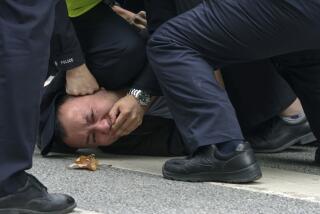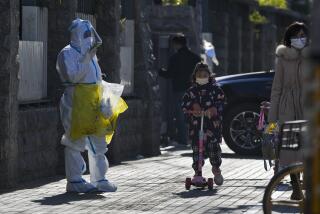China tries to restore order after migrant riots
- Share via
Reporting from Beijing — Chinese authorities struggled to restore order Monday after migrant workers, angry over the manhandling of a pregnant vendor, overturned police cars, smashed windows and set fires near the southern manufacturing hub of Guangzhou.
It began as a run-of-the mill altercation Friday night when city authorities tried to clear the migrants, who are from Sichuan province, as they hawked produce in front of a supermarket in Zengcheng, on the outskirts of Guangzhou. But the ferocity of the rioting over the weekend exposed the fragility of social order in the nation.
Videos shared via social media show scenes much like the violent protests in recent years in China’s Tibet or Xinjiang regions. In this case, however, the protesters were migrant workers, a population often unhappy about its status as second-class citizens in eastern coastal cities.
Chinese officials responded Monday by censoring the offending videos. And the husband of the pregnant 20-year-old vendor was trotted out at a televised news conference Sunday night to report that his wife and unborn child were fine.
“The case was just an ordinary clash between street vendors and local public security people, but was used by a handful of people who wanted to cause trouble,” Ye Niuping, the mayor of Zengcheng, said at the news conference. Special groups were going door to door to speak with migrant workers at factories and dormitories, he said.
The Chinese government has reason for concern. Last week, migrants from Sichuan clashed with police and overturned cars in Chaozhou, about 210 miles east of Guangzhou, after a worker demanding two months of back wages was allegedly attacked by the boss of the ceramics factory where he had worked. In Lichuan, in Hubei province, there have been riots over the death of an imprisoned anti-corruption crusader.
Over the weekend, two people were slightly injured when a bomb exploded near a government building in the northern city of Tianjin. Authorities said the assailant was seeking “revenge against society.” It was the third bombing directed at the government in less than a month and might have been a copycat case inspired by a May 26 triple bombing committed by a man whose land was confiscated.
A sociologist at Beijing’s Tsinghua University reported this year that China has had 180,000 “mass incidents” in 2010, double the number in 2006.
“There are a lot of resentments built up among ordinary people who are frustrated trying to get by on a daily basis with prices going up and the difficulty of young people in finding decent jobs,” said Geoffrey Crothall, an analyst with the Hong Kong-based China Labor Bulletin. “Any little spark can set things off.”
More to Read
Sign up for Essential California
The most important California stories and recommendations in your inbox every morning.
You may occasionally receive promotional content from the Los Angeles Times.













